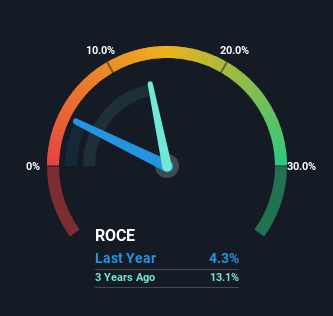Returns On Capital Signal Tricky Times Ahead For Shanghai Newtouch Software (SHSE:688590)
What trends should we look for it we want to identify stocks that can multiply in value over the long term? Ideally, a business will show two trends; firstly a growing return on capital employed (ROCE) and secondly, an increasing amount of capital employed. Basically this means that a company has profitable initiatives that it can continue to reinvest in, which is a trait of a compounding machine. Although, when we looked at Shanghai Newtouch Software (SHSE:688590), it didn't seem to tick all of these boxes.
Understanding Return On Capital Employed (ROCE)
If you haven't worked with ROCE before, it measures the 'return' (pre-tax profit) a company generates from capital employed in its business. The formula for this calculation on Shanghai Newtouch Software is:
Return on Capital Employed = Earnings Before Interest and Tax (EBIT) ÷ (Total Assets - Current Liabilities)
0.043 = CN¥77m ÷ (CN¥2.7b - CN¥908m) (Based on the trailing twelve months to December 2023).
Therefore, Shanghai Newtouch Software has an ROCE of 4.3%. On its own that's a low return on capital but it's in line with the industry's average returns of 4.4%.
Check out our latest analysis for Shanghai Newtouch Software

While the past is not representative of the future, it can be helpful to know how a company has performed historically, which is why we have this chart above. If you'd like to look at how Shanghai Newtouch Software has performed in the past in other metrics, you can view this free graph of Shanghai Newtouch Software's past earnings, revenue and cash flow.
What Can We Tell From Shanghai Newtouch Software's ROCE Trend?
On the surface, the trend of ROCE at Shanghai Newtouch Software doesn't inspire confidence. Over the last five years, returns on capital have decreased to 4.3% from 15% five years ago. However, given capital employed and revenue have both increased it appears that the business is currently pursuing growth, at the consequence of short term returns. If these investments prove successful, this can bode very well for long term stock performance.
On a side note, Shanghai Newtouch Software has done well to pay down its current liabilities to 34% of total assets. So we could link some of this to the decrease in ROCE. Effectively this means their suppliers or short-term creditors are funding less of the business, which reduces some elements of risk. Since the business is basically funding more of its operations with it's own money, you could argue this has made the business less efficient at generating ROCE.
Our Take On Shanghai Newtouch Software's ROCE
Even though returns on capital have fallen in the short term, we find it promising that revenue and capital employed have both increased for Shanghai Newtouch Software. Furthermore the stock has climbed 69% over the last three years, it would appear that investors are upbeat about the future. So should these growth trends continue, we'd be optimistic on the stock going forward.
On a final note, we found 3 warning signs for Shanghai Newtouch Software (2 can't be ignored) you should be aware of.
While Shanghai Newtouch Software isn't earning the highest return, check out this free list of companies that are earning high returns on equity with solid balance sheets.
New: Manage All Your Stock Portfolios in One Place
We've created the ultimate portfolio companion for stock investors, and it's free.
• Connect an unlimited number of Portfolios and see your total in one currency
• Be alerted to new Warning Signs or Risks via email or mobile
• Track the Fair Value of your stocks
Have feedback on this article? Concerned about the content? Get in touch with us directly. Alternatively, email editorial-team (at) simplywallst.com.
This article by Simply Wall St is general in nature. We provide commentary based on historical data and analyst forecasts only using an unbiased methodology and our articles are not intended to be financial advice. It does not constitute a recommendation to buy or sell any stock, and does not take account of your objectives, or your financial situation. We aim to bring you long-term focused analysis driven by fundamental data. Note that our analysis may not factor in the latest price-sensitive company announcements or qualitative material. Simply Wall St has no position in any stocks mentioned.
About SHSE:688590
Shanghai Newtouch Software
Operates as a software and information technology services company in China.
High growth potential and fair value.
Market Insights
Community Narratives



